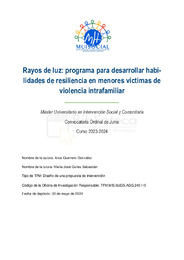Por favor, use este identificador para citar o enlazar este ítem:
https://hdl.handle.net/11000/34147Registro completo de metadatos
| Campo DC | Valor | Lengua/Idioma |
|---|---|---|
| dc.contributor.advisor | Quiles Sebastián, María José | - |
| dc.contributor.author | Guerrero González, Aroa | - |
| dc.contributor.other | Facultad de medicina | es_ES |
| dc.date.accessioned | 2024-12-13T12:28:00Z | - |
| dc.date.available | 2024-12-13T12:28:00Z | - |
| dc.date.created | 2024-06-02 | - |
| dc.identifier.uri | https://hdl.handle.net/11000/34147 | - |
| dc.description.abstract | El presente trabajo de fin de máster propone una propuesta de intervención destinada a desa-rrollar habilidades de resiliencia en menores víctimas de violencia intrafamiliar. Se trabaja en la mejora de cuatro variables fundamentales: nivel de resiliencia, autoestima, bienestar emo-cional y psicológico y apoyo social. La intervención va dirigida a menores de 13 a 17 años que residen en un centro de protección de menores en Elche. En las 10 sesiones se proponen actividades basadas en el juego de roles, actividades de relajación y otras técnicas, con el fin de fomentar la adaptación positiva y la gestión emocional de los menores. Para evaluar la eficacia de la intervención se utilizará un diseño pre-post y se aplicarán los siguientes instru-mentos: la Escala de Resiliencia SV-RES, la Escala de Autoestima de Coopersmith, el Cues-tionario de Salud General GHQ-28 y el Cuestionario MOS para evaluar el apoyo social. Como limitaciones del programa se han identificado la variabilidad en el tiempo de residencia de los menores en el centro y la no inclusión de la familia en el programa | es_ES |
| dc.description.abstract | This master's thesis proposes an intervention proposal aimed at developing resilience skills in children who are victims of domestic violence. It works on the improvement of four fundamen-tal variables: level of resilience, self-esteem, emotional and psychological well-being and so-cial support. The intervention is aimed at children between 13 and 17 years old who reside in a child protection center in Elche. In the 10 sessions, activities based on role-playing, relaxa-tion activities and other techniques are proposed in order to promote positive adaptation and emotional management of minors. To evaluate the effectiveness of the intervention, a pre-post design will be used and the following instruments will be applied: the SV-RES Resilience Scale, the Coopersmith Self-Esteem Scale, the GHQ-28 General Health Questionnaire and the MOS Questionnaire to evaluate social support. Limitations of the program were identified as the variability in the time of residence of the minors in the center and the non-inclusion of the family in the program. | es_ES |
| dc.format | application/pdf | es_ES |
| dc.format.extent | 32 p. | es_ES |
| dc.language.iso | spa | es_ES |
| dc.publisher | Universidad Miguel Hernández | es_ES |
| dc.rights | info:eu-repo/semantics/openAccess | es_ES |
| dc.rights | Attribution-NonCommercial-NoDerivatives 4.0 Internacional | * |
| dc.rights.uri | http://creativecommons.org/licenses/by-nc-nd/4.0/ | * |
| dc.subject | Violencia intrafamiliar | es_ES |
| dc.subject | Menores | es_ES |
| dc.subject | Ayuda social | es_ES |
| dc.subject | Domestic violence | es_ES |
| dc.subject | Children | es_ES |
| dc.subject | Social Support | es_ES |
| dc.subject.other | CDU::6 - Ciencias aplicadas::61 - Medicina | es_ES |
| dc.title | Rayos de luz: programa para desarrollar habilidades de resiliencia en menores víctimas de violencia intrafamiliar | es_ES |
| dc.type | info:eu-repo/semantics/masterThesis | es_ES |

Ver/Abrir:
Guerrero_Gonzalez_Aroa_TFM.pdf
664,43 kB
Adobe PDF
Compartir:
 La licencia se describe como: Atribución-NonComercial-NoDerivada 4.0 Internacional.
La licencia se describe como: Atribución-NonComercial-NoDerivada 4.0 Internacional.
.png)